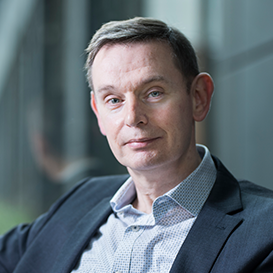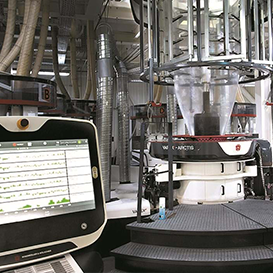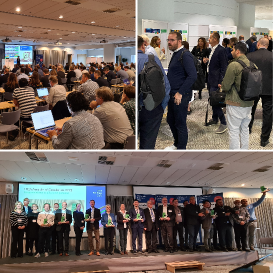SPEAR
A new approach to energy optimisation for industry

- Project
start
September 2017 - Project
end
September 2020 - Project
leader
Anton Georgiev Strahilov
EKS InTec GmbH, Germany - More
information
https://spear-project.eu
With the first global energy crisis ongoing, energy consumption and optimisation are very important concerns in today’s life. This is true for households but definitely also for industrial players, as many of them are still using a lot of energy for their daily processes. However, in industrial plants, energy optimisation is impossible if there is no knowledge on how much energy is needed to perform a production process. And often, there is an unfortunate lack of energy measurement units integrated into real production systems.
By precisely calculating the energy consumption, industrial customers can save energy and thereby costs. Energyintensive processes, for example, can be shifted to time windows where cheaper and sufficient energy is available. This plays a significant role in the use of renewable energies such as wind power or solar energy. To overcome this lack of energy consumption knowledge and to make energy optimisation truly accessible, a change is needed.
Flexible and highly generic optimisation platform
Luckily, the ITEA project SPEAR which successfully ran from 2017- 2020 and gathered 22 partners from Germany, Portugal, Spain, Sweden and Türkiye, overcomes available energy optimisation challenges by means of a unique mechanism. Instead of using estimated or simplified models for simulation-based optimisation, the SPEAR solution makes use of real device-provided simulation models in order to produce highly accurate forecasts for the energy consumption of industrial production processes. The accuracy of these forecasts, together with the optimisation algorithms developed, enables a significant reduction of energy consumption and costs.
SPEAR created a flexible and highly generic optimisation platform and did not focus on isolated industry sectors; a broad spectrum of application domains was supported, like production processes in common plants, production lines, buildings, hybrid drives, and wind turbine drive trains. The energy-specific optimisation of new and existing production plants during virtual commissioning and running production was also supported.
Thanks to these great achievements, SPEAR received the Eureka Innovation Award for ‘Best Sustainability Innovation’ during the Eureka Global Innovation Summit in June 2022.
Digital twin and shadow
A central innovation of SPEAR is the mirroring of the energy consumption of the production plant by simulating extended behavioural models on low-cost hardware. This hardware is also used for embedded hardware-inthe- loop (HIL) simulations that run in parallel with the real plant so that the digital twin of a plant is extended with a digital shadow. This allows highly flexible and cost-effective approaches to be explored and implemented and the planning and execution of the production system to be optimised through accurate simulation of the production processes. This supports efforts such as Industry 4.0.
The project partners created digital models (called energy models) to represent the energy behaviour of each component in the production system, inputting real signals from the system’s programmable logic controller (PLC) into a simulation environment in order to calculate its needs. The resulting energy profiles are linked to a model of the production system process to enable the relevant optimisation.
10% energy reduction
Energy optimisation is one of the grand challenges of today, so SPEAR’s results must be placed within a larger context of both business and society. By helping companies to optimise their energy usage, SPEAR enables them to manage resources more effectively and increase their productivity in a sustainable manner. Through the smart selection of energy sources, the smart adaptation of process-relevant parameters and the reduction of power peaks, SPEAR has been able to reduce energy costs by roughly 10%.
Through the smart selection of energy sources, the smart adaptation of process-relevant parameters and the reduction of power peaks, SPEAR has been able to reduce energy costs by roughly 10%
Specifically, German SME project partner Reeb-Engineering has realised a service for simulationbased Automated Guided Vehicle (AGV) path planning while taking energy consumption into account. With the results of SPEAR and the experience gained in the field of virtual commissioning, Reeb-Engineering is able to already predict the energy consumption of an AGV during the development process of the vehicle. This prediction allows the optimisation of the battery size, the driving path, the charging time and ultimately the manufacturing and operating costs. After the completion of the project, they hired one new employee who is involved in this service. Furthermore, the knowledge gained in SPEAR has opened up a completely new field of work in virtual commissioning for a wide range in industrial applications and thus a new business area that is becoming increasingly popular.
KANCA, one of the leading forging companies in Türkiye, has seen a decrease of 4 kWh/kg (8%) thanks to the project results and Atkas, a pioneer in the sector of air suspension system production, has improved its energy optimisation by 5%.
Swedish project partner and service provider ÅF has improved its service by being able to consider energy in the virtual commissioning of plants. This has provided ÅF with a unique selling point for its service over other competitors, allowing them to receive more orders, which in turn increases the value of their turnover.
Algoryx’s AGX Dynamics simulation tool has been updated with a new module that can compute energy consumption. This has been used in several research projects that use AI together with the simulation software to create smart control and path planning, for which energy optimisation has been one of the objectives. The customers include users and manufacturers of different heavy machinery in areas like mining, forestry and construction - industries that have a lot of potential when it comes to reducing energy needs and lowering emissions.
Sensing & Control Systems (S&C), a Spanish SME, has integrated the SPEAR results into its proprietary commercial platform enControl™, extending it from smart homes to the industrial sector and incorporating novel functionalities and services created during project development for the management of ovens and other intensive energy-consuming machineries in related businesses. Thanks to this, S&C has three new industrial customers and was able to hire one additional staff member. S&C has also incorporated the Functional Mock-up Interface (FMI) industrial standard, which increased their reliability and reputation.
In addition to energy optimisation and business impact, several new employees and nine PhD students have been taken on across the consortium as a direct result of the SPEAR project.
Vital role in reducing CO2 and the speed of climate change
SPEAR will allow companies of all sizes to reap such benefits by making its results available as free software prototypes. Further dissemination is taking place through the formation of two standards:
- an interface description for optimisation algorithms based on the JSON data format and
- an optimisation algorithm realised as a REST service.
In turn, this should allow for a greater uptake of renewable energies (such as solar and wind) which were previously difficult to optimise on a large scale due to their weather dependency. This gives SPEAR a vital role in reducing CO2 emissions and slowing the speed of climate change throughout society as a whole.

Other chapters
Use the arrows to view more chapters

Editorial
By Jean-François Lavignon

Country Focus: Spain
Competitiveness through collaboration

ACCURO
Coming back for more – the pull of ITEA

ITEA Success story: REVaMP²
REVaMP² enables profitable engineering of mass-customised products and services

Community talk with Jos van Sas
The delights of being on the circle’s edge

By and for end-users
Vizelpas pushes predictive maintenance to the next level in the PIANiSM project

ITEA Success story: SPEAR
A new approach to energy optimisation for industry

Glancing back at the ITEA PO Days 2022 & Family reunion
Three days of familiar onsite inspiration and innovation

SME in the spotlight: KE-Works
Where digitalisation and collaboration meet

